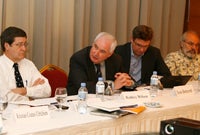Background and Scope of the Project

The CIRS research project on ‘The Political Economy of the Gulf’ was launched in 2009. As with other CIRS research initiatives, after a thorough review of existing literature on the topic, certain gaps were identified meriting further original research and scholarship. Select scholars were invited to participate in a working group for focused discussions on a range of sub-topics. During these meetings the participants contributed their expertise, and began working on papers in their area specialties. The ultimate product of this research project is a book on The Political Economy of the Persian Gulf, published by Oxford University Press.
BackgroundDue to the tremendous increase in petroleum prices between 2002-2008, the GCC nations found themselves with unprecedented earning capacity and spending power. As budget surpluses grew, this region saw the launching of many mega projects combined with acceleration in the pace of over-seas investments. The sudden drop in oil prices in early 2009 combined with the global financial crisis clearly also has implications for the boom in this region, and on the shape of future economic development for the GCC states.The Gulf nations are often thought of in ‘block’ terms, and despite subtle differences there are still similar patterns and paths to regional economic development. All of the six states have nascent, young financial sectors and have difficulty in trying to successfully diversify themselves from their “rentier” or resource-based economies. All of the GCC countries are monarchical in structure, and have for the most part centralized control over earning and spending. Each country also displays certain trends relating to labour and demographic pressures, such as a burgeoning youth population, heavy reliance on foreign workers, and high unemployment or underemployment rates for their national populations. Based on our own study of the political economy of the region, and through the course of our discussions with the scholars who are working with us, we identified specific areas which require further academic scrutiny.
Amongst other themes, some of which we aim to address through this project are:
The Rentier Traps/Resource CurseNations that have economies based on the sale, export, and rent of their natural resources have a particular character and unique shape. The distinctive dynamic for how these states’ elites manage their wealth and govern their populations, has inspired ongoing scrutiny for political scientists and economists engaged in research on the Persian Gulf region.
Sovereign Wealth Funds (SWFs) in the GCCSovereign Wealth Funds are the state owned funds that serve as the critical investment arms of the GCC governments. Since the 1950s SWFs have been a tool by which countries have used their surplus foreign exchange to purchase assets. Today some of the richest sovereign wealth funds in the world are located in the Persian Gulf. Due to accrued oil and gas wealth which lead to national budget surpluses and huge reserves of capital, the United Arab Emirates, Saudi Arabia, Qatar and Kuwait are all owners of some of the largest SWFs in the world.
Knowledge Based EconomiesThe knowledge-based economy is one that emphasizes and makes full use of the role of knowledge in social and economic growth. This knowledge is embodied specifically in two areas: technology and human capital. In a knowledge-based economy, the development, production, growth and dissemination of information and technology is the most essential component. Improving human capital through is the second essential component. The KBE is charachterised by the increasing demand for highly-skilled workers. The GCC’s heavy investment in educating and training its citizenry aims to fulfill of that demand
Labour and Demography and the GCCThe six states of the GCC all exhibit very high unemployment rates among their youth. The rising rate of unemployment amongst young people parallels an increase in governmental oil revenues, and there has been criticism leveled at the regional governments for neglecting to utilize these surplus funds to effectively combat unemployment rates. The prevailing statistics indicate that young people in GCC are generally ill-prepared to compete for private sector jobs. The system of high-pay job creation in the government sector is also unsustainable as there is employment saturation in the public sector.
While official statistics are hard to come by, unofficial estimates put unemployment in Bahrain, Saudi Arabia and Oman at 15% or more, and unemployment in the 16-24 year age bracket at 35% or more. What further exacerbates the problem is that the GCC has one of the world’s youngest and burgeoning populations. As an example, Saudi youth (those under the age of 25) make up 61% of the population. As such, the potential for more acute regional job shortages for young people and resultant socio-economic problems in the future cannot be discounted.
GCC Monetary UnionThe creation of a monetary union has been one of the primary objectives of the Gulf Cooperation Council members since the early 1980s. Significant progress has already been made with regards to regional economic integration. The GCC countries have largely unrestricted intraregional mobility of goods, labor, and capital; regulation of the banking sector is being harmonized; and in 2008 the countries established a common market. The GCC states have also successfully met most of the convergence criteria established for entry into a monetary union.
Islamic FinanceIn recent times Islamic lending facilities have been seeing a period of intense growth across the GCC. Most Islamic banks are seen to be faring better than interest –based lending facilities. Examining the nature of Islamic banking in the region, its processes of legislation and regulation is critical to understanding the regional financial sector.In addition to the thematic streams of scholarship that we are including in this project, we also have several scholars working on country case studies. The Political Economy of the Gulf book project will have chapters devoted to a study of the Dubai model, the Saudi Arabian political economy, and the political economy of Iran.
Click here to read more about another related CIRS research initiative, “Political Economy of the Contemporary Middle East.”